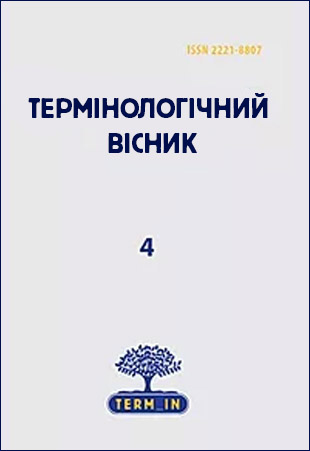Motivation of Physical Eponimic Terms

Founders
National Academy of Sciences of Ukraine,
Institute of Ukrainian Language of NAS
Publisher
Institute of the Ukrainian Language of National Academy of Sciences of Ukraine
Scientific journal Ukrainian Language is registered by the Ministry of Justice of Ukraine as print media (Certificate: Series КВ № 12180 – 1064 ПР of January 12, 2007).
Included in the list of printed scientific specialized editions of Ukraine (Order of MES of Ukraine no528 from 12.05.2015)
Back side of the journal
Roman Mykulchyk
Information about the author:
Candidate of Philological Sciences, Secretary of the Technical Committee of Standardization of Scientific and Technical Terminology, National University “Lviv Polytechnic” (Lviv, Ukraine)
e-mail: mykulchyk@ukr.net.
Title: Motivation of Physical Eponimic Terms
Rubric: Branch Terminology
Abstract: Eponimic terms are an integral part of scientific terminology. Their research take an important place among modern problems of terminology. Eponyms – terms. which include the names or surnames of persons or their derivatives, that became special language unit. World scientific (including natural sciences) community for centuries follows the tradition perpetuate the names of the greatest scientists and inventors in terms. Such terms automatically become internationalized, every language adapts them to its structure inherent in her way and the inherent model.
In linguistics there is no consensus about what name implies – anthroponys or other names – can be the basis for the creation of the term, eponyms (or be a term derived from proper names). As a special name may derive from anthroponyms, mythonyms, theonyms, ethnonyms, kosmonyms. Research in terminology argue that the main condition for the creation of terms is presence-anthroponymy historical mention of the existence of any of those persons whose names underlying the creation of eponyms.
The motivation plays a prominent role in term building. It should be considered as one of the elements that ensure consistency of terminology. This quantitative and qualitative characteristics of internal form that genetically inherent in any terminololgical unit. Not being one of the main criteria for evaluation of the term, it helps him remember, facilitates linkages with other terms.
The question of motivation eponimic physical terms in Ukrainian linguistics has not raised. According to many scientists, such important question as motivation needs particular attention.
Eponyms are associative terms, allocated by type of motivation. The motivation is expressed indirectly, through various kinds of associations. The proper names (or family components) plays role of recognizing components for eponymic terms.
The motivation is an important feature of terms. In linguistic science there is no unambiguous interpretation of this concept. Physical eponimic terms are motivated. One of their motivators are exactly eponyms (name or suename of the scientist from which it was formed). These terms have different degrees of motivation regarding their exactly eponyms. For simple eponyms motivation is characterized by a mediate and immediate degree, for complex and compound – mediate and immediate degrees. Motivation of physical eponymous terms is associative. Of course, motivation requires further research in linguistics as well as in terminology and, first off all, creating a consistent unified theory of motivation
Keywords: eponymic term, physical terminology, motivation.
References:
- Budagov, R.A. (1953). Ocherki po yazykoznaniyu. Moscow: Izd-vo Akad. nauk SSSR (in Rus.).
- Gerd, A.S. (1995).Vvedenie v etnolingvistiku. St. Petersburg (in Rus.).
- Dziuba, M.M. (2009). Osoblyvosti motyvovanosti eponimichnykh terminiv. Semantyka movy i tekstu: materialy X Mizhnar. nauk. konf (Ivano-Frankivsk, 2009). (pp. 80–82). Ivano-Frankivsk (in Ukr.).
- Zanizdra, N.O. (2007). Problema motyvovanosti naukovoho termina.Visnyk Kremenetskoho natsionalnoho universytetu im. M. Ostrohradskoho, Vyp. 2 (43), 98–102 (in Ukr.).
- Kyiak, T.R. (2008). Vuzkohaluzevi terminy yak osnova formuvannia ta kvazireferuvannia fakhovykh tekstiv. Visnyk Natsionalnoho universytetu “Lvivska politekhnika”. Seriia “Problemy ukrainskoi terminolohii”, № 620, 3–5 (in Ukr.).
- Kyiak, T.R. (1989). Lingvisticheskie aspekty terminovedeniya. Kyiv: UMK VO (in Rus.).
- Litvinenko, A.S. (1954). Termin i metafora. Uchen. zap. 1-go Mosk. gos. ped. in-ta inostr. yaz., 1954, T. 8, 255 (in Rus.).
- Lotte, D.S. (1982). Voprosy zaimstvovaniya i uporyadocheniya inoyazychnyh terminov i terminoelementov. Moscow: Nauka (in Rus.).
- Mykulchyk, R.B. (2009). Osnovni strukturni modeli skladenykh eponimiv fizychnoi terminolohii. Visnyk Nats. un-tu “Lvivska politekhnika”. Seriia “Problemy ukrainskoi terminolohii”, 2009, № 648, 74–77 (in Ukr.).
- Mykhailyshyn, B.P. (1994). Z istorii terminiv-eponimiv. Movoznavstvo, 1994, № 4–5, 45–50 (in Ukr.).
- Molodec, V.N. (1983). Nekotorye problemy terminologicheskoj polisemii. Termin i slovo. In Predmetnaya otnesyonnost’ i funkcionirovanie terminov (pp. 11–21). Gor’kij (in Rus.).
- Panko, T.I. (1984). Zovnishnomovna ta vnutrishnomovna motyvovanist suspilno-politychnykh terminiv. Ukrainske movoznavstvo, Vyp. 12, 11–17 (in Ukr.).
- Panko, T.I., Kochan, I.M., & Matsiuk, H.P. (1994). Ukrainske terminoznavstvo. Lviv: Svit (in Ukr.).
- Superanskaja, A.V., Podol’skaja, N.V., & Vasil’eva, N.V. (2008). Obshhaja terminologija. Moscow: Izd-vo LKI (in Rus.).


